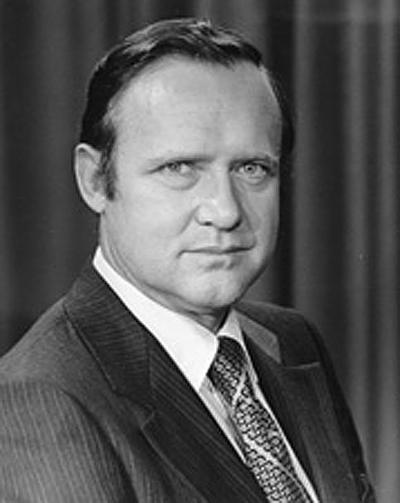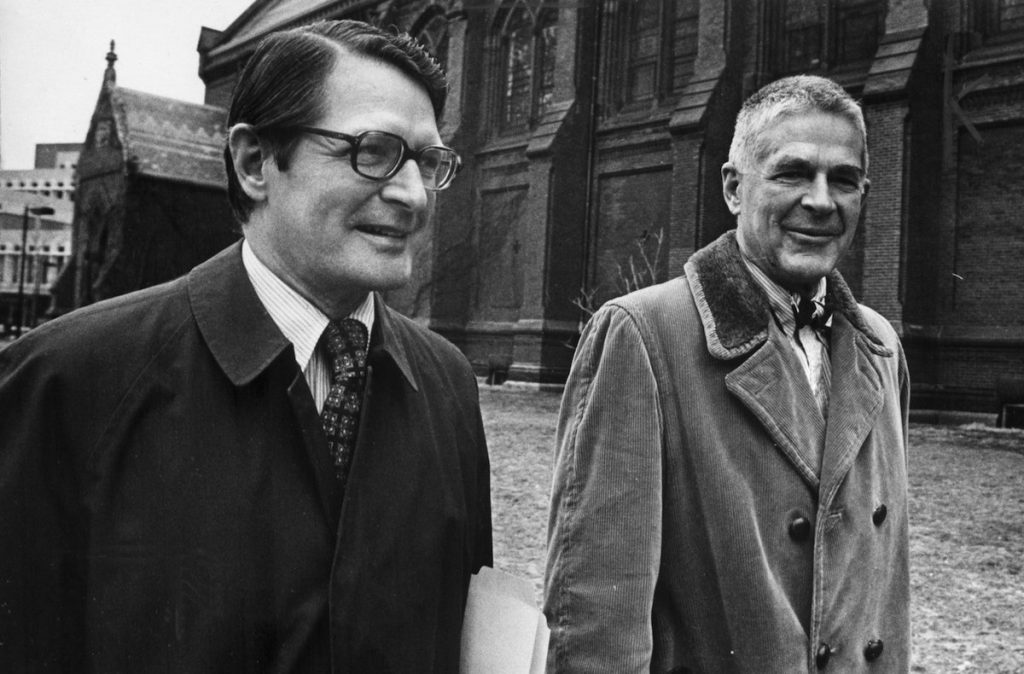In his masterful biography of Richard Nixon the journalist John A. Farrell recounts the last days – it was the summer of 1974 – of Nixon’s presidency with a variety of anecdotes that are chilling in their relevance to the drama currently unfolding in Washington, D.C.

Most who remember their history will recall that it fell to two Arizona Republicans, Barry Goldwater and John Rhodes, and Senate minority leader Hugh Scott of Pennsylvania to troop to the White House in early August and tell Nixon that his support on Capitol Hill had evaporated. He was sure to be impeached and convicted.
It’s not precisely true as political legend has it that the GOP heavyweights told Nixon to resign. They didn’t need to. The master politician who based his entire career, as Garry Wills once wrote, on “mobilizing resentment against those in power” got the message. The power was against him. Nixon immediately told his family “we’re going back to California.”
Proof, contained on an Oval Office tape recording, of Nixon ordering the cover-up of the Watergate burglary had sealed his fate. “This is it,” Rhodes said at the time. “It’s all over. There was the smokin’ gun. He had it in his hand.”
Nixon had refused to turn over the tapes, of course, and only did so when compelled by a unanimous order from the Supreme Court.
In his book Farrell recounts one phenomenal earlier conversation – it occurred in July 1974 – involving former chief justice Earl Warren, like Nixon a Californian and a Republican, and two sitting justices of the high court, William O. Douglas and William Brennan. Douglas and Brennan visited Warren in the hospital where he was recovering from a heart attack and before it was certain that the Court would force release of Nixon’s smokin’ gun.

Warren, however, was certain of what must happen. “If Nixon is not forced to turn over tapes of his conversations,” the former chief justice said, “with the ring of men who were conversing on their violations of the law, then liberty will soon be dead in this nation.”
* * *
A famous line is attributed to Mark Twain: “History doesn’t repeat, but it does rhyme.” So it is with Tricky Dick and Dissembling Donald. As it was in 1974, so it is in 2019.
I got to wondering what the political mood was in Idaho when Nixon’s crimes were the dominate theme in the country, when Democrats in Congress struggled mightily to investigate a stonewalling White House and when another president attempted to obstruct justice by among other acts firing the special counsel investigating the Watergate affairs.
Idaho Republicans almost to a person supported Nixon until the absolute end. The precise dynamic is playing out now with GOP support for Trump.

In May 1973, after Nixon’s two top White House aides had resigned and after White House counsel John Dean had been fired, then-Idaho Republican Senator James A. McClure gave what Associated Press reporter David Espo called a “tough and disturbing” speech in Twin Falls. In the speech to a Republican audience, McClure lashed out at journalists for what he termed “stealing records of grand juries” – syndicated columnist Jack Anderson had reported on leaked grand jury testimony pertaining to Watergate – and blasted federal judges acting out of what McClure called “rather self-righteous motives.” That was a clear reference to Judge John Sirica, who by that point had sentenced two of the Watergate burglars to stiff prison sentences.
Espo wrote that McClure specifically exonerated Nixon for not taking the Watergate burglary more seriously since the senator contended Nixon was preoccupied with his re-election and affairs of state.
In October 1973, a few days after Nixon fired special counsel Archibald Cox – the infamous Saturday Night Massacre – Don Todd, then the executive director of the Idaho Republican Party, defended Nixon and sounded eerily like Trump defenders today.
House and Senate members who talk of impeachment, Todd said, would “disgrace themselves” with their overreaching. There was nothing wrong with Nixon’s handling of the Oval Office tapes, Todd contended, and said the president was justified in firing the special counsel.
John Farrell wrote that Nixon’s decision to fire Cox was the real beginning of the end for the president. The Washington establishment, he recounts, had reached a consensus – Nixon was trying to put himself above the law, but the Idaho delegation with the exception of Democrat Frank Church continued to passionately defend Nixon.
After Cox was fired McClure said the former solicitor general was a ”stubborn, willful man” and that it was inevitable that Nixon would sack him. And sounding like a Trump defender today, McClure discounted Cox as nothing more than a liberal Democrat who made no secret of “his partisan views.” For his part, First District Congressman Steve Symms said Nixon had every right to fire anyone in the executive branch “from the secretary of defense to a janitor at HEW.” But, Symms did allow that it was a legitimate question as to whether Nixon should have fired the man investigating his actions.

As the long course of the events that we now collectively call Watergate, from the arrest of the men who broke into Democratic Party headquarters in June 1972 to Nixon’s resignation in August 1974, Idaho Republicans stood by Richard Nixon.
McClure never admitted that Nixon’s actions related to Watergate constituted grounds for impeachment, but did tell his biographer that had he still been in the Senate he would have voted to convict Bill Clinton for lying to a grand jury about his relationship with a White House intern. No one is above the law, McClure said, obviously missing the hypocrisy.
When Nixon did resign, McClure said there were “literally no words to express the compassion” he felt for Nixon. And as for any punishment for the former president, McClure declared, “enough is enough … you don’t kick a man when he’s down.”
Orval Hansen, the Republican congressman from Idaho’s Second District, was more measured. Nixon had done the right thing by resigning, Hansen said, since his ability to continue in office had been destroyed by the revelation that he had ordered a cover-up and lied about it. Ironically, Hansen lost in a primary in 1974 in part, many Idaho observers concluded, because Nixon’s taint rubbed off on him.
The rhyming will continue.
—–0—–
